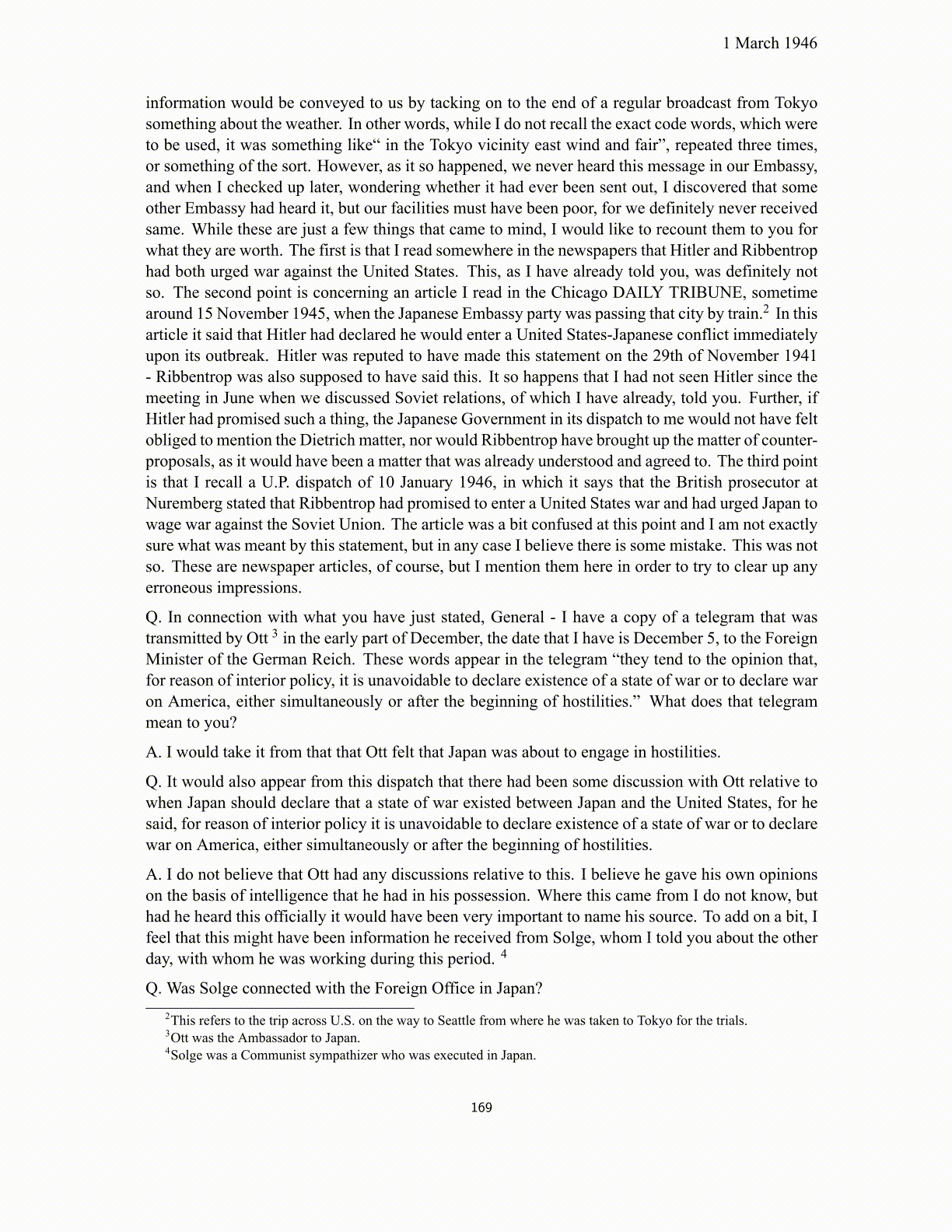
1 March 1946 information would be conveyed to us by tacking on to the end of a regular broadcast from Tokyo something about the weather. In other words, while I do not recall the exact code words, which were to be used, it was something like“ in the Tokyo vicinity east wind and fair”, repeated three times, or something of the sort. However, as it so happened, we never heard this message in our Embassy, and when I checked up later, wondering whether it had ever been sent out, I discovered that some other Embassy had heard it, but our facilities must have been poor, for we definitely never received same. While these are just a few things that came to mind, I would like to recount them to you for what they are worth. The first is that I read somewhere in the newspapers that Hitler and Ribbentrop had both urged war against the United States. This, as I have already told you, was definitely not so. The second point is concerning an article I read in the Chicago DAILY TRIBUNE, sometime around 15 November 1945, when the Japanese Embassy party was passing that city by train. 2 In this article it said that Hitler had declared he would enter a United States-Japanese conflict immediately upon its outbreak. Hitler was reputed to have made this statement on the 29th of November 1941 - Ribbentrop was also supposed to have said this. It so happens that I had not seen Hitler since the meeting in June when we discussed Soviet relations, of which I have already, told you. Further, if Hitler had promised such a thing, the Japanese Government in its dispatch to me would not have felt obliged to mention the Dietrich matter, nor would Ribbentrop have brought up the matter of counter- proposals, as it would have been a matter that was already understood and agreed to. The third point is that I recall a U.P. dispatch of 10 January 1946, in which it says that the British prosecutor at Nuremberg stated that Ribbentrop had promised to enter a United States war and had urged Japan to wage war against the Soviet Union. The article was a bit confused at this point and I am not exactly sure what was meant by this statement, but in any case I believe there is some mistake. This was not so. These are newspaper articles, of course, but I mention them here in order to try to clear up any erroneous impressions. Q. In connection with what you have just stated, General - I have a copy of a telegram that was transmitted by Ott 3 in the early part of December, the date that I have is December 5, to the Foreign Minister of the German Reich. These words appear in the telegram “they tend to the opinion that, for reason of interior policy, it is unavoidable to declare existence of a state of war or to declare war on America, either simultaneously or after the beginning of hostilities.” What does that telegram mean to you? A. I would take it from that that Ott felt that Japan was about to engage in hostilities. Q. It would also appear from this dispatch that there had been some discussion with Ott relative to when Japan should declare that a state of war existed between Japan and the United States, for he said, for reason of interior policy it is unavoidable to declare existence of a state of war or to declare war on America, either simultaneously or after the beginning of hostilities. A. I do not believe that Ott had any discussions relative to this. I believe he gave his own opinions on the basis of intelligence that he had in his possession. Where this came from I do not know, but had he heard this officially it would have been very important to name his source. To add on a bit, I feel that this might have been information he received from Solge, whom I told you about the other day, with whom he was working during this period. 4 Q. Was Solge connected with the Foreign Office in Japan? 2 This refers to the trip across U.S. on the way to Seattle from where he was taken to Tokyo for the trials. 3 Ott was the Ambassador to Japan. 4 Solge was a Communist sympathizer who was executed in Japan. 169